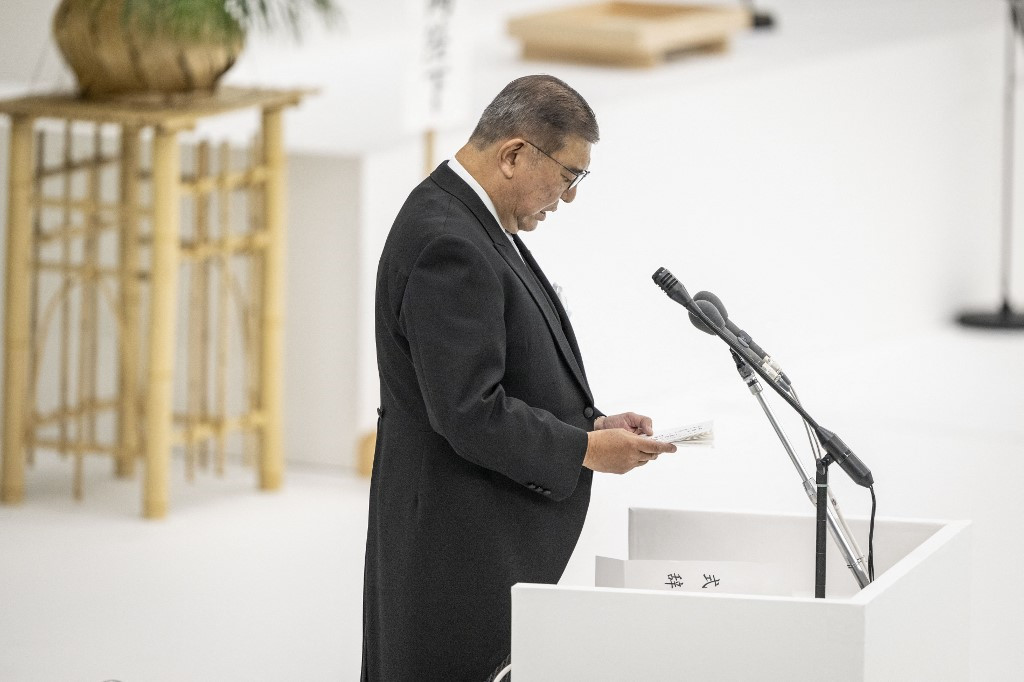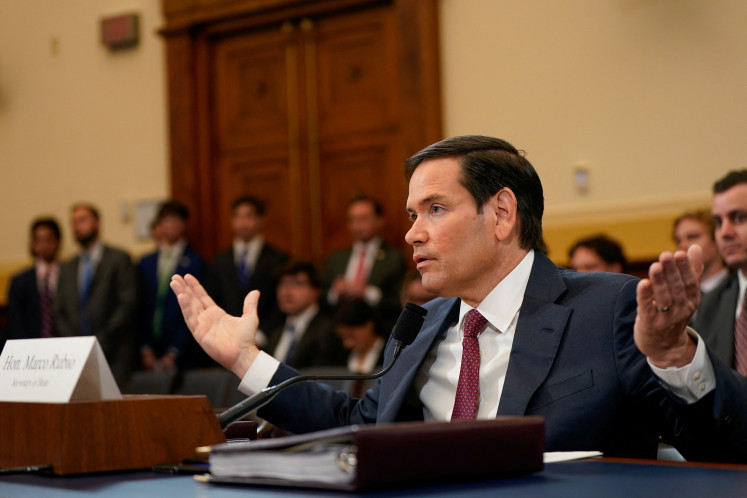Popular Reads
Top Results
Can't find what you're looking for?
View all search resultsPopular Reads
Top Results
Can't find what you're looking for?
View all search resultsIshiba stresses lessons of war, civilian control
Ishiba renewed Japan's pledge to pursue peace in his message marking 80 years since the end of World War II, stressing the importance of civilian control over the military as a key lesson from the war rather than delving into divisive historical interpretations.
Change text size
Gift Premium Articles
to Anyone
P
rime Minister Shigeru Ishiba on Friday renewed Japan's pledge to pursue peace in his message marking 80 years since the end of World War II, stressing the importance of civilian control over the military as a key lesson from the war rather than delving into divisive historical interpretations.
In the message released in his final days as prime minister, Ishiba said he upholds the views on history expressed in statements by his predecessors for the 50th, 60th, and 70th war anniversaries, and emphasized the importance of "each and every individual to proactively" reflect on the past war and peace.
"I believe the foundation as a pacifist nation will be further strengthened (through such efforts by the public)...especially at a time when memories are feared to fade," he said.
Unlike past milestone anniversary statements, Ishiba's remarks were prepared without Cabinet endorsement, apparently heeding concerns from conservative members of his ruling Liberal Democratic Party who view the 70th anniversary statement by then Prime Minister Shinzo Abe as having drawn a line under Japan's "apology diplomacy" toward countries like China and South Korea that suffered from its wartime aggression.
Ishiba told a press conference held to announce the message that the historical views he upholds from the predecessor Cabinets include the "feelings of remorse and apology."
On the past war, he also said, "the government has never said 'it was not aggression.' We must be aware of that."
A large portion of Ishiba's message was devoted to explaining why Japan failed to avert a "reckless war" and continued with it even as defeat was seen as "inevitable" by a research institute in the then Army Ministry and other experts.
He cited "the government's loss of control over the military," as well as the parliament's malfunction and the media's role in fueling nationalism and spreading propaganda as major factors that led Japan to carry on with the war, which ended with an unconditional surrender in August 1945.
"Since our nation has been put in the most severe and complicated security situation, now is the time to remind ourselves of the importance of learning from history," the 68-year-old leader said.
He said that while civilian control of the Self-Defense Forces has become firmly established since its creation under the postwar pacifist Constitution, politicians must make "consistent efforts" to ensure civilian oversight of the armed organization and the capacity and knowledge to "fully utilize" it.
SDF members, for their part, are required to "proactively explain and express their opinions" to the government side "as a group of experts," Ishiba, who has served as defense chief in the past, said.
Ishiba, who took office in October last year, had sought to issue a Cabinet-approved document for the 80th war anniversary, but the idea was scuttled in the face of opposition from among members of his own party.
On the 50th anniversary in 1995, then Prime Minister Tomiichi Murayama, leader of a major left-leaning party, expressed "deep remorse" and offered his "heartfelt apology" for Japan causing damage and suffering to the people of many nations.
Regarding the 70th anniversary in 2015, Abe, a conservative who pushed for Japan to play a greater security role overseas, stopped short of issuing a fresh apology, although he mentioned that the country has "repeatedly expressed the feelings of deep remorse" and offered its "heartfelt apology for its actions during the war."
In a speech on this year's Aug. 15 war-end anniversary, Ishiba highlighted the need for Japan to retain its "remorse" over the war, becoming the first prime minister in over a decade to use the term at the annual memorial ceremony for the war dead.
Ishiba said last month that he will resign following setbacks in national elections, but he continued to explore releasing his 80th war anniversary message, apparently to leave a legacy.
As for the timing of the message, Ishiba said it was a result of taking time to organize his thoughts and what he has learned.
Ishiba, known as an Abe critic, has been mindful of Japan's militarist past and has stressed the need for mutual "trust" and "respect" in relations with other Asian nations that suffered Japan's wartime aggression and colonization.










